For graduates, research is the most crucial component of their education. The top research ideas are supported by Canadian university students. They also give financial compensation to researchers in the form of scholarships. Research in a wide range of study subjects is supported by cutting-edge technology and resources at institutions like the University of Toronto, which is a global leader in research and innovation.
In Canada, students are encouraged to adopt unconventional thinking. Canada invests a lot of resources in providing ELP and FLP, support services, workshops, and training for academic and personal improvement needed by international students.
Applied Research and Development (ARD) Grant by Natural Sciences and Engineering Research Council of Canada (NSERC)
The Applied Research and Development (ARD) Grants aim to give Canadian-based businesses access to the distinctive knowledge, expertise, and capabilities offered at Canadian schools and to educate students in the fundamental technical skills needed by businesses. ARD Grants assist college researchers and their collaborators in the private sector with well-defined initiatives for applied research and development. The project’s business partner(s) and NSERC split any direct project expenditures. The length of a project can be from one year to three years.
Suitable Candidates: An application may be made by Canadian colleges that have been approved to administer awards in accordance with the standards set forth by at least one of the three federal grant-making organizations (NSERC, CIHR, and/or SSHRC) for colleges.
- The college must provide courses in the applied research fields mentioned as well as the social sciences, humanities, and/or health sciences.
- Faculty from the college who receive ARD Grants must conduct applied research in the humanities, social sciences, engineering, and/or natural sciences.
The college must give its academic members in the natural sciences, engineering, social sciences, humanities, and/or health sciences the space, resources, and support they need to perform practical research.
Eligible costs: Direct costs of research must be covered by ARD Grant funding; however, a small portion of these funds can also be used for overhead and administrative costs, as well as for operating and equipment costs (up to 20% of the total expenditures) (a further 20 percent of the total award). Up to ten percent of the overall direct costs, certain project management expenses are admissible as direct costs of research. The cost of any additional indirect or overhead expenses must be covered by the college.
Deadline: Ongoing
Contact Name: Applied Research and Development
Phone Number: 613-944-5802
E-mail Address: [email protected]
Industrial Research Assistance Program (IRAP) by National Research Council Canada (NRC)
The goal of the Industrial Research Assistance Program (IRAP) is to assist businesses in creating technologies and successfully launching them on a worldwide scale. It provides qualifying Canadian small and medium-sized businesses with consulting services, finance, and networking opportunities. The following programs are available for eligible businesses to apply for financial aid:
- Projects in Technology Innovation
- programs for the Youth Employment Strategy
- CHTD
Suitable Candidates:
- Be an incorporated small and medium-sized business focusing on profitability in Canada.
- Fewer than 500 full-time equivalent workers
- To develop and commercialize new or better products, services, or processes that are innovative, technology-driven, and profitable in Canada.
Eligible costs: At various stages of the innovation cycle, NRC IRAP provides funds to support research and development projects. The NRC IRAP was required to increase the financing threshold for larger research and development projects to up to $10 million in 2018–2019. Small and medium-sized Canadian firms will find it simpler to get the assistance they require to develop and grow their enterprises as a result of the increased funding support.
Deadline: Ongoing
Contact Name: IRAP
Phone Number: 1-877-994-4727
E-mail Address: [email protected]
Research Capacity Program
In order to increase capacity in Alberta’s post-secondary institutions and to draw in, keep, and develop academics working on transformative research and applied research projects, the Research Capacity Program (RCP) is a competitive financing program.
The following competition streams are part of the RCP:
- Applied research infrastructure in colleges and polytechnics is supported through College-Industry Innovation (CII).
- Research Infrastructure (RI) offers substantial research infrastructure for research teams of up to 10 principle users, whereas Cyberinfrastructure (CYB) serves the infrastructure demands of computationally and data-intensive research.
- Research equipment for lone researchers or small teams is supported by Small Equipment Grants (SEG).
Suitable Candidates: The CFI Policy and Program Guide must be followed regarding eligibility standards, application procedures, and other associated specifications for all submissions to the RCP.
Suitable organizations: The RCP follows the CFI’s requirements for application eligibility. RCP streams are therefore only available at institutions that have been granted CFI eligibility. For further information, please consult the CFI Policy and Program Guide.
Eligible costs: Successful submissions to the RCP can receive up to 40% of the total eligible project expenditures through a cost-shared funding model, allowing projects to benefit from funding from the Canada Foundation for Innovation (CFI) and other sources.
Deadline: Varies.
Contact Name: Government of Alberta
Phone Number: 310-0000 (in Alberta) or 780-427-2711
Office of Energy Research and Development (OERD)
The management and advancement of energy research and development across the federal government is the responsibility of Natural Resources Canada’s Office of Energy Research and Development (OERD). Since 1974, OERD has worked to ensure that federal energy research and development priorities are shared across departments and agencies through initiatives like the Program of Energy Research and Development (PERD) and, more recently, a portion of the Energy Innovation Program (EIP).
Through funding related RD&D initiatives in federal departments and agencies, the numerous programs that make up the Federal Internal Energy R&D suite support and encourage energy RD&D. To ensure resources are used wisely, coordinate research efforts, and enhance decision-making in federal energy RD&D investments, OERD builds on the synergies among participants.
Suitable Candidates: On a regular basis or as opportunities arise, Canadian federal departments and agencies take part in the program. The private sector (business, utilities, research institutes, industry associations), other funding organizations, universities, provincial and municipal governments, research organizations, and international organizations are all encouraged to collaborate with them.
Eligible costs: Four missions have been created by OERD to direct each research effort across the federal government in order to strengthen synergies and guarantee alignment with government priorities. Research has been focused, cross-missional synergies have been ensured, and research and development duplication has been minimized through the creation of each Mission.
- Accelerate electrification and maximize the advantages of low-emitting heat and power through increasing energy efficiency and processes to reduce emissions from energy end-use.
- Create cleaner pathways for renewable and hydrocarbon fuels
- To safeguard Canadians in the face of a changing energy landscape, maintain reliable and secure energy systems.
Deadline: Please visit the link given below for further information.
Contact Name: Office of Energy Research and Development (OERD) – Natural Resources Canada
E-mail Address: [email protected]
Research and Innovation Program
Research that promotes Yukon agriculture is funded by the Research and Innovation Program.
This comprises:
- Supporting participation in circumpolar research that directly benefits the Yukon agriculture sector, such as the Circumpolar Agricultural Conference, small-scale research projects or pilot projects, funding for the development and upkeep of northern agricultural research and demonstration programs in Yukon, etc.
Suitable Candidates
- Producers
- Processors
- Firms that produce or process
- Agricultural nonprofits
- Governments
Eligible costs
- The design, preparation, implementation, and maintenance of the agriculture research program are included, as well as the cost of the research’s tools, materials, and supplies, including data loggers, weather stations, soil probes, and other equipment.
- Research areas include farm management, production, processing, marketing, conservation practices, new technologies, and funding.
- Collaborations on research initiatives concerning agribusiness, agriculture, and food processing in the north and around the poles that involve collaborations between federal agencies, businesses, institutions, and universities.
- Travel for: obtaining information; and creating networks of knowledge on circumpolar agriculture with other northern regions and circumpolar nations.
- Travel for meetings, workshops, seminars, conferences, and participation in circumpolar research initiatives and educational exchanges, as well as to attend and speak at northern and circumpolar agricultural events.
Deadline: Ongoing
Contact Name: Government of Yukon, Agriculture Branch
Phone Number: 867-667-5838
E-mail Address:[email protected]
College and Community Innovation Program (CCI) – Applied Research and Development Grants
The Canadian Institutes of Health Research (CIHR), the Social Sciences and Humanities Research Council of Canada, and the Natural Sciences and Engineering Research Council of Canada (NSERC) work together to run the College and Community Innovation (CCI) Program (SSHRC). To NSERC, all applications must be filed. Applied Research and Development (ARD) Grants are available in a variety of fields, including the humanities, engineering, the natural and social sciences, and/or health. Except for funded projects that are exclusively in the social sciences, humanities, and/or health sciences, which will be handled by SSHRC or CIHR, respectively, grants are awarded by NSERC.
Suitable Candidates:
An application may be made by Canadian colleges that have been approved to administer awards in accordance with the standards set forth by at least one of the three federal grant-making organizations (NSERC, CIHR, and/or SSHRC) for colleges. The college must be approved to obtain money from the NSERC, CIHR, or SSHRC if the proposed research and knowledge/technology transfer activities wholly fall under that organization’s purview.
- The college must provide courses in the social sciences, humanities, engineering, natural sciences, and/or health sciences that are related to the suggested fields of applied research.
- Faculty members from the college who are receiving ARD Grants must be working on applied research projects in the humanities, social sciences, engineering, and/or natural sciences.
- The college is required to give its academic members in the natural sciences, engineering, social sciences, humanities, and/or health sciences the space, resources, and services they need to perform practical research.
The qualifying firm partner(s) must actively participate and contribute at least half of the amount asked in CCI support, in cash and/or in kind—of which at least half, i.e., 25% of the requested grant amount, must be in cash. This requirement applies to grants up to $75,000 per year. If the application asks for $75,000 annually, for instance, the firm contribution must be at least $37,500 annually, of which at least $18,750 must be in cash.
The qualifying firm partner(s) contribution(s) must be at least equal to the amount requested in CCI support, in cash and/or in kind—of which at least 40% must be in cash—for awards between $75,000 and $150,000 per year.
Eligible costs: Direct costs of research must be covered by ARD Grant funding; however, a small portion of these funds can also be used for overhead and administrative costs, as well as for operating and equipment costs (up to 20% of the total expenditures) (a further 20 percent of the total award). Up to ten percent of the overall direct costs, certain project management expenses are admissible as direct costs of research. The cost of any additional indirect or overhead expenses must be covered by the college.
Deadline: No deadline.
Contact Name: Natural Sciences and Engineering Research Council of Canada
Phone Number: 1-855-275-2861
Joint Initiative for Digital Citizen Research
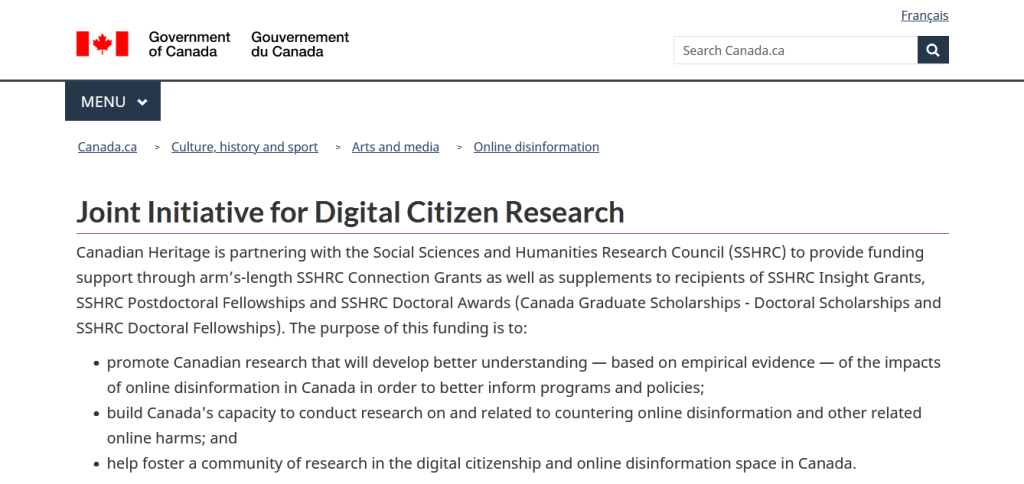
The objectives of the Digital Citizen Initiative and the Government of Canada’s approach to defending democracy are supported by the Joint Initiative for Digital Citizen Research.
This funding will be used to:
Enhance Canada’s capacity to conduct research on and related to countering online disinformation and other related online harms; foster a community of researchers in the digital citizenship and online disinformation space in Canada; and support Canadian research that will develop a better understanding of the impacts of online disinformation in Canada based on empirical evidence in order to inform programs and policies better.
Suitable Candidates
- Research teams and individuals linked with qualifying Canadian postsecondary institutions working in one or more of the targeted areas of interest may apply for insight grants. Research on online misinformation and other online harms, as well as their effects in the Canadian context, is funded through Insight Grants.
- Supplements for postdoctoral fellowships are available to SSHRC postdoctoral fellows who are affiliated with a Canadian post-secondary institution and are engaged in research in one or more of the targeted fields of study.
- Holders of Doctoral Scholarships or SSHRC Doctoral Fellowships who are associated with an eligible Canadian post-secondary institution and are engaged in research in one or more of the target areas or areas of interest may be eligible for Doctoral Award Supplements.
- Connection Grants are available to organizations, individuals, and teams. To support short-term, focused knowledge mobilization projects, they fund a number of events and outreach programs. These gatherings and activities offer chances to share knowledge and work on investigations into online misinformation, other online harms, and their effects in the Canadian context.
Deadline: Varies
Contact Name: Department of Canadian Heritage
Phone Number: 1-866-811-0055 (toll-free)
Engage Grants by Natural Sciences and Engineering Research Council of Canada (NSERC)
The goal of Engage Grants is to provide creative businesses with a Canadian base with access to the distinctive knowledge, skills, and capabilities offered at Canadian universities and colleges (see the List of Eligible Institutions). By funding short-term research and development initiatives focused on solving a company-specific problem, or a challenge connected to the company’s core capabilities or operations, these awards are meant to encourage the creation of new research collaborations.
University and college academics can swiftly start new research collaborations that extend academic expertise to these issues thanks to the streamlined application and decision processes. The initiatives, which will benefit both parties, are anticipated to have a positive economic impact on Canada and the applicant while fostering fruitful longer-term partnerships.
Suitable Candidates: Researchers from colleges and institutions are eligible to apply for Engage Grants. The collaborating company must participate in the initiative and offer tangible assistance. There must be no prior collaboration between the company and the researcher.
Eligible costs:
- salaries and benefits for technical, professional, and academic workers
- Operating costs for equipment, materials, and supplies, as well as consulting fees (up to 20% of the project costs may be allocated to the purchase or rental of equipment, materials, supplies, and/or consulting fees for supplemental knowledge or the accomplishment of particular project tasks) (approved only with a strong demonstration of need)
- Travel (College personnel’s expenses for travel related to the project are covered. This excludes international gatherings where scientific findings are presented.)
- cost of faculty release
- Costs of networking and technology transfer
- overhead and management (Up to 20 percent of the grant amount can be requested for eligible overhead costs).
Deadline: Ongoing
Contact Name: NSERC – Prairies Regional Office
Phone Number: 1-877-767-1767
E-mail Address:[email protected]
Scientific Research and Experimental Development
The Scientific Research and Experimental Development (SR&ED) tax incentive program, which is Canada’s largest R&D program, is available to businesses of any size who invest in research and development (R&D) in that country.
Suitable Candidates
- private enterprises with Canadian ownership (CCPC)
- Additional private companies
- Individuals, trusts, and partnership members
Eligible costs
Projects eligible for R&D:
- Distinguish a technological or scientific ambiguity
- Consider or make an effort to consider a technological improvement, and
- Utilize a thorough inquiry or search
SR&ED Tax Incentives: Types
- basic study
- applied study
- innovative development
There are two types of tax incentives available: Investment tax credit, which can be carried forward to a future year or used to offset income taxes owed in the current year or a previous year. The credit may be refundable in specific circumstances.
Deadline: Ongoing
Contact Name: Invest in Canada
Mining Research and Innovation Support Program by the Government of Québec
To guarantee that Québec mining operations stay competitive and keep up with worldwide advances in the sector, the Ministry of Energy and Natural Resources (MERN) believes it is critical to promote research and innovation in the mining sector. The research and innovation support program aims to encourage innovation in the mining industry through research and development efforts among Québec mining enterprises.
Phases of mining development that the program focuses on are:
- Development and exploration
- Exploitation\sProcessing
- Mine restoration and rehabilitation
Environment-related goals:
- the development of or testing of techniques to reduce greenhouse gases and the adaptation of mining activities in Quebec to climate change
- Mine sites and mine tailings are being made available for sale.
- Any additional environmental goal
societal goals:
- Improve the social acceptance conditions
- Reduce the negative effects of mining any other social goal
Suitable Candidates: Any business corporation or group of business corporations engaged in the mining industry that is registered with the Registrar des Entreprises du Québec and is based in Québec is eligible for the program.
Deadline: Ongoing.
Contact Name: MERN
Phone Number: 418-627-6278
E-mail Address: [email protected]
Conclusion
Canada is a significant research station worldwide and an IT park as well. It is a well-known nation for doing research and offers advantages to researchers in all areas, including financial support and scholarships for their work.
Canada never makes distinctions based on a student’s subject of study; instead, it encourages them to pursue research in any area, regardless of that field. If the study proposal is approved, a significant contribution from the students will be supported by finances from both the government and the organization.
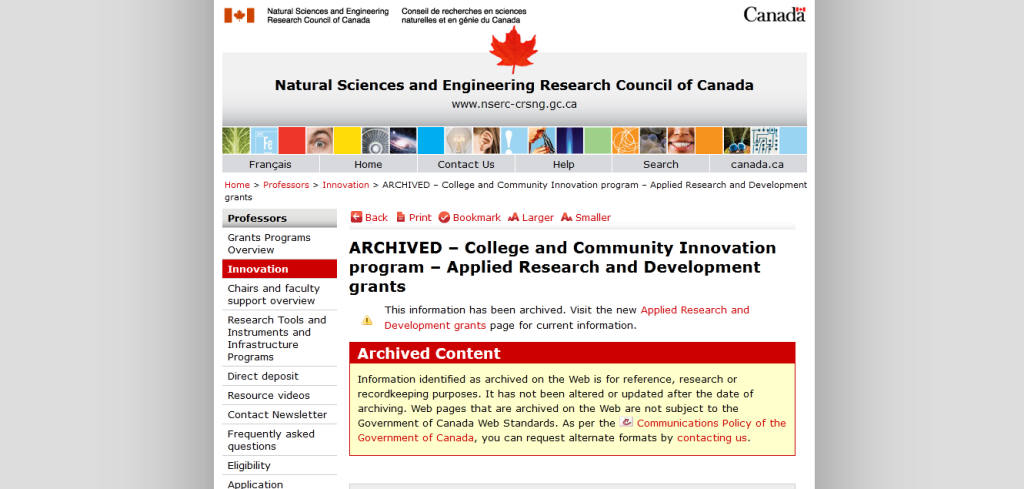
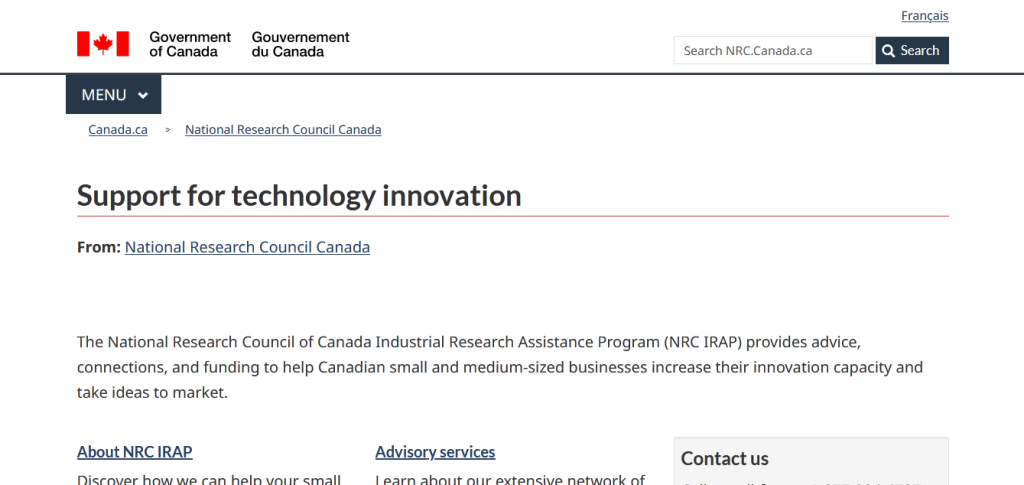
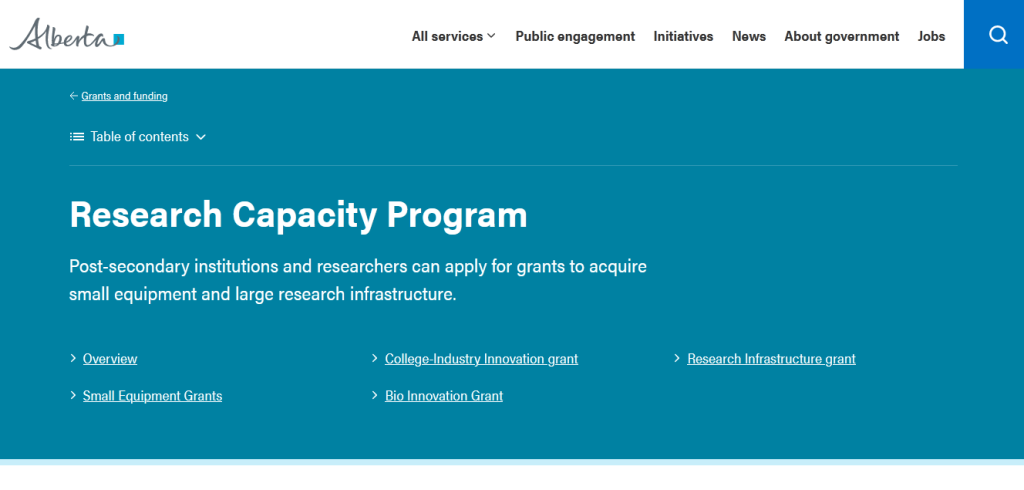
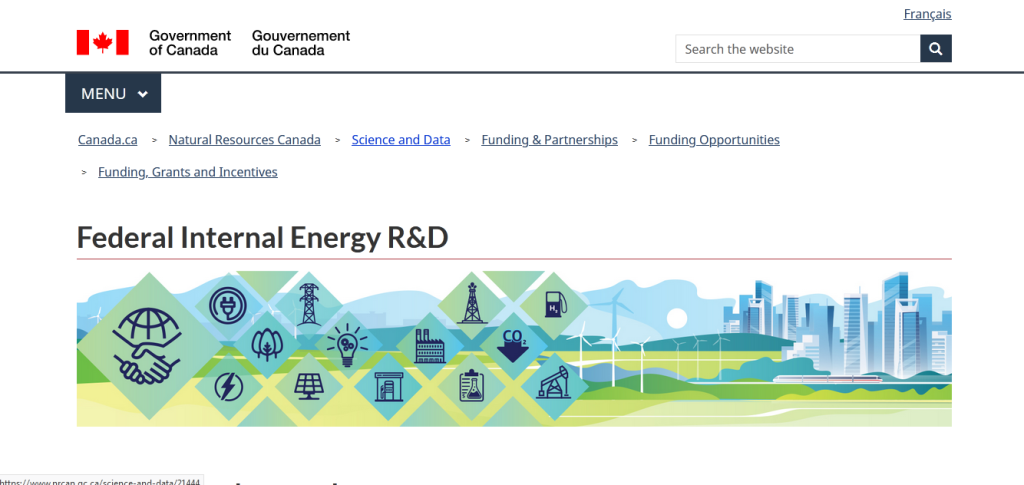
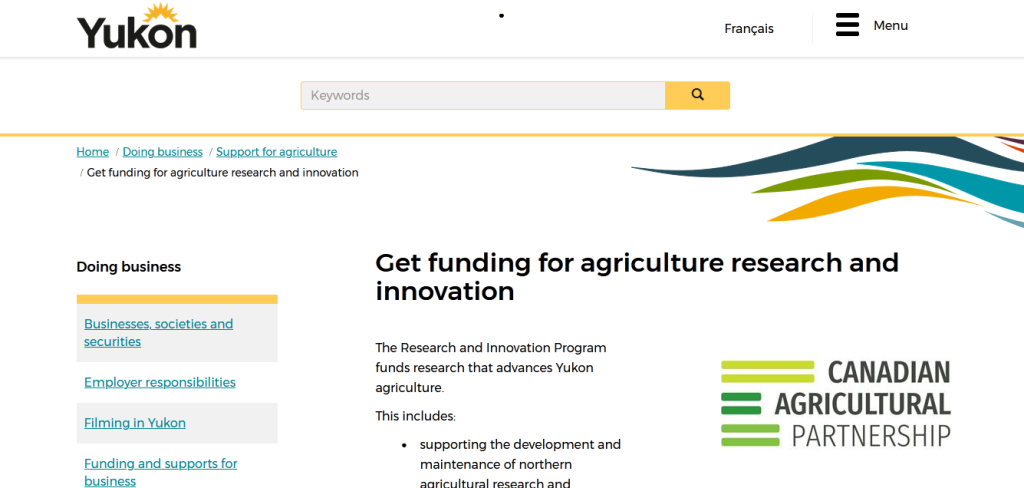
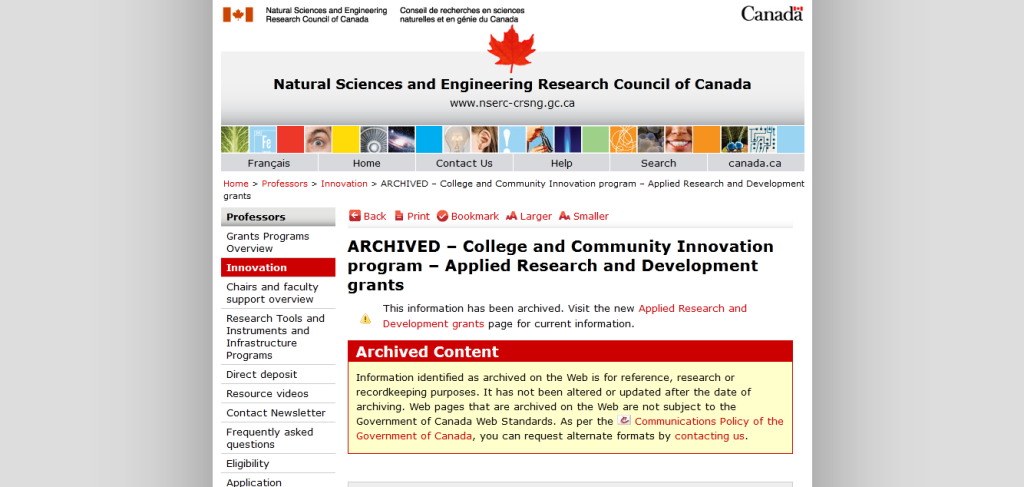
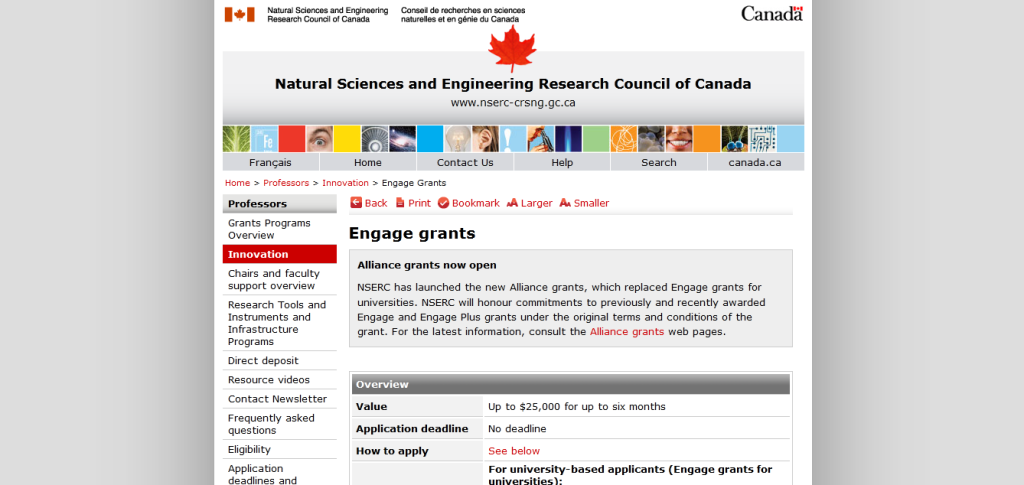
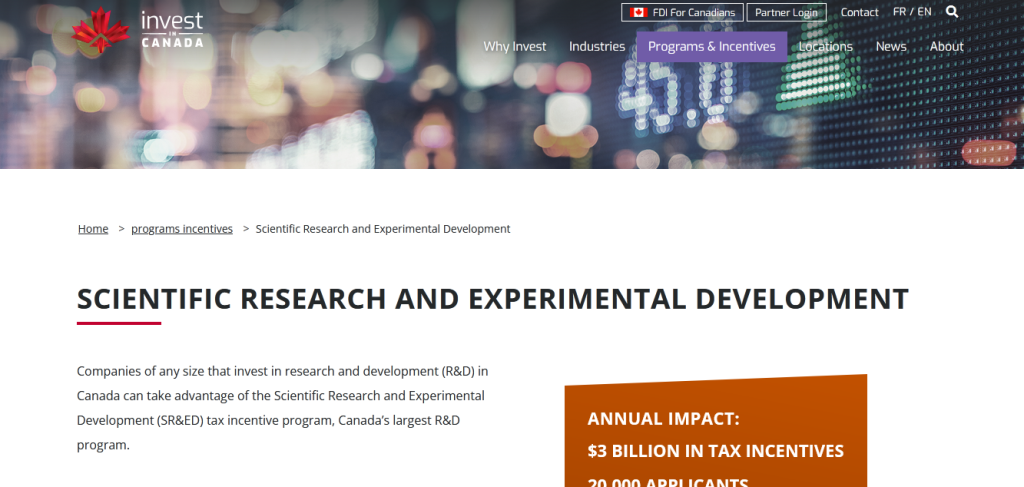
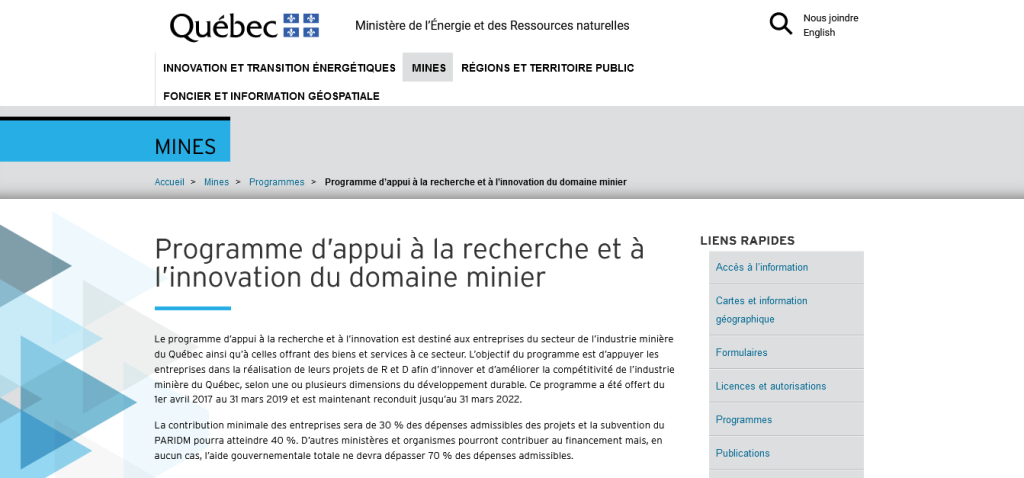



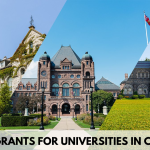


Leave a Reply